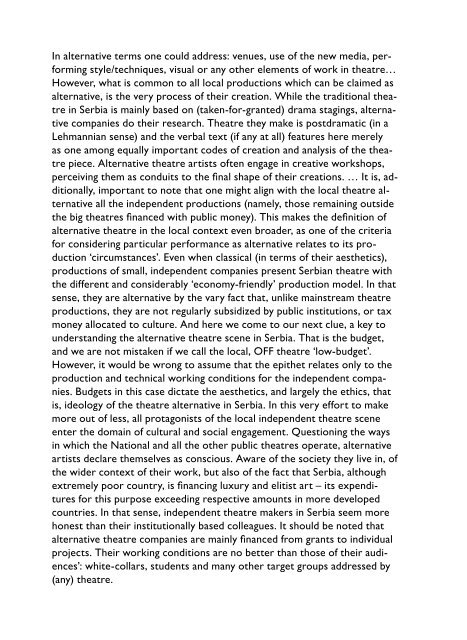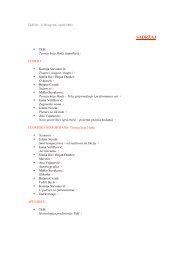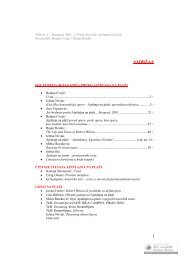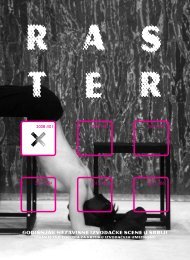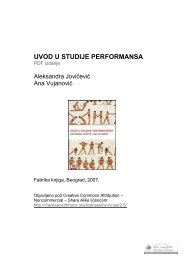Yearbook of the Independent Performing Arts Scene in Serbia - TkH
Yearbook of the Independent Performing Arts Scene in Serbia - TkH
Yearbook of the Independent Performing Arts Scene in Serbia - TkH
Create successful ePaper yourself
Turn your PDF publications into a flip-book with our unique Google optimized e-Paper software.
In alternative terms one could address: venues, use <strong>of</strong> <strong>the</strong> new media, perform<strong>in</strong>gstyle/techniques, visual or any o<strong>the</strong>r elements <strong>of</strong> work <strong>in</strong> <strong>the</strong>atre…However, what is common to all local productions which can be claimed asalternative, is <strong>the</strong> very process <strong>of</strong> <strong>the</strong>ir creation. While <strong>the</strong> traditional <strong>the</strong>atre<strong>in</strong> <strong>Serbia</strong> is ma<strong>in</strong>ly based on (taken-for-granted) drama stag<strong>in</strong>gs, alternativecompanies do <strong>the</strong>ir research. Theatre <strong>the</strong>y make is postdramatic (<strong>in</strong> aLehmannian sense) and <strong>the</strong> verbal text (if any at all) features here merelyas one among equally important codes <strong>of</strong> creation and analysis <strong>of</strong> <strong>the</strong> <strong>the</strong>atrepiece. Alternative <strong>the</strong>atre artists <strong>of</strong>ten engage <strong>in</strong> creative workshops,perceiv<strong>in</strong>g <strong>the</strong>m as conduits to <strong>the</strong> f<strong>in</strong>al shape <strong>of</strong> <strong>the</strong>ir creations. … It is, additionally,important to note that one might align with <strong>the</strong> local <strong>the</strong>atre alternativeall <strong>the</strong> <strong>in</strong>dependent productions (namely, those rema<strong>in</strong><strong>in</strong>g outside<strong>the</strong> big <strong>the</strong>atres f<strong>in</strong>anced with public money). This makes <strong>the</strong> def<strong>in</strong>ition <strong>of</strong>alternative <strong>the</strong>atre <strong>in</strong> <strong>the</strong> local context even broader, as one <strong>of</strong> <strong>the</strong> criteriafor consider<strong>in</strong>g particular performance as alternative relates to its production‘circumstances’. Even when classical (<strong>in</strong> terms <strong>of</strong> <strong>the</strong>ir aes<strong>the</strong>tics),productions <strong>of</strong> small, <strong>in</strong>dependent companies present <strong>Serbia</strong>n <strong>the</strong>atre with<strong>the</strong> different and considerably ‘economy-friendly’ production model. In thatsense, <strong>the</strong>y are alternative by <strong>the</strong> vary fact that, unlike ma<strong>in</strong>stream <strong>the</strong>atreproductions, <strong>the</strong>y are not regularly subsidized by public <strong>in</strong>stitutions, or taxmoney allocated to culture. And here we come to our next clue, a key tounderstand<strong>in</strong>g <strong>the</strong> alternative <strong>the</strong>atre scene <strong>in</strong> <strong>Serbia</strong>. That is <strong>the</strong> budget,and we are not mistaken if we call <strong>the</strong> local, OFF <strong>the</strong>atre ‘low-budget’.However, it would be wrong to assume that <strong>the</strong> epi<strong>the</strong>t relates only to <strong>the</strong>production and technical work<strong>in</strong>g conditions for <strong>the</strong> <strong>in</strong>dependent companies.Budgets <strong>in</strong> this case dictate <strong>the</strong> aes<strong>the</strong>tics, and largely <strong>the</strong> ethics, thatis, ideology <strong>of</strong> <strong>the</strong> <strong>the</strong>atre alternative <strong>in</strong> <strong>Serbia</strong>. In this very effort to makemore out <strong>of</strong> less, all protagonists <strong>of</strong> <strong>the</strong> local <strong>in</strong>dependent <strong>the</strong>atre sceneenter <strong>the</strong> doma<strong>in</strong> <strong>of</strong> cultural and social engagement. Question<strong>in</strong>g <strong>the</strong> ways<strong>in</strong> which <strong>the</strong> National and all <strong>the</strong> o<strong>the</strong>r public <strong>the</strong>atres operate, alternativeartists declare <strong>the</strong>mselves as conscious. Aware <strong>of</strong> <strong>the</strong> society <strong>the</strong>y live <strong>in</strong>, <strong>of</strong><strong>the</strong> wider context <strong>of</strong> <strong>the</strong>ir work, but also <strong>of</strong> <strong>the</strong> fact that <strong>Serbia</strong>, althoughextremely poor country, is f<strong>in</strong>anc<strong>in</strong>g luxury and elitist art – its expendituresfor this purpose exceed<strong>in</strong>g respective amounts <strong>in</strong> more developedcountries. In that sense, <strong>in</strong>dependent <strong>the</strong>atre makers <strong>in</strong> <strong>Serbia</strong> seem morehonest than <strong>the</strong>ir <strong>in</strong>stitutionally based colleagues. It should be noted thatalternative <strong>the</strong>atre companies are ma<strong>in</strong>ly f<strong>in</strong>anced from grants to <strong>in</strong>dividualprojects. Their work<strong>in</strong>g conditions are no better than those <strong>of</strong> <strong>the</strong>ir audiences’:white-collars, students and many o<strong>the</strong>r target groups addressed by(any) <strong>the</strong>atre.


